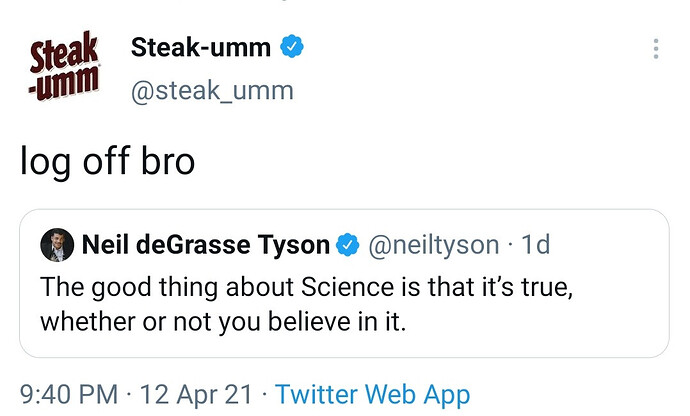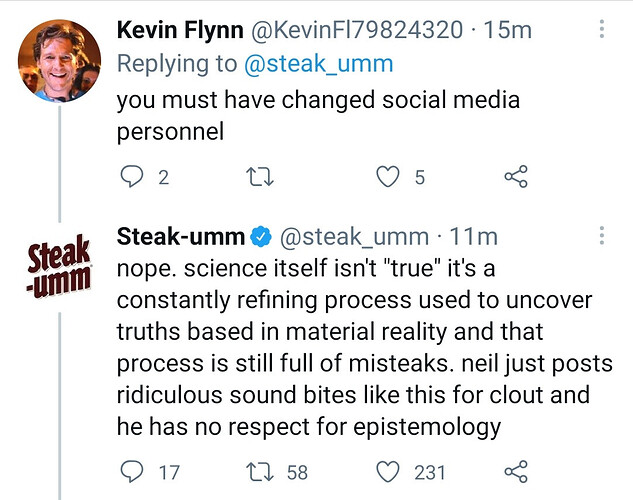IMO, Michigan should fully shut down and everyone in MI should get an extra 1k stimulus, immediately deposited directly into their Pokerstars account.
So far, most people in this forum are on Team Steak-umm.
Here’s a free (kindel) 2020 collection of papers on the general topic of scientific knowledge/truth from the standpoint of perspectival realism or liberal naturalism (in hiliary putnam’s phrase) or poetic naturalism (sean carroll).
It’s not only science popularisers or Steak-ums who think about this stuff. It’s pretty popular among philosophers.
This open access book – as the title suggests – explores some of the historical roots and epistemological ramifications of perspectivism. Perspectivism has recently emerged in philosophy of science as an interesting new position in the debate between scientific realism and anti-realism. But there is a lot more to perspectivism than discussions in philosophy of science so far have suggested. Perspectivism is a much broader view that emphasizes how our knowledge (in particular our scientific knowledge of nature) is situated; it is always from a human vantage point (as opposed to some Nagelian “view from nowhere”). This edited collection brings together a diverse team of established and early career scholars across a variety of fields (from the history of philosophy to epistemology and philosophy of science). The resulting nine essays trace some of the seminal ideas of perspectivism back to Kant, Nietzsche, the American Pragmatists, and Putnam, while the second part of the book tackles issues concerning the relation between perspectivism, relativism, and standpoint theories, and the implications of perspectivism for epistemological debates about veritism, epistemic normativity and the foundations of human knowledge.
Am third person to report 2nd dose (Pfizer) today. CVS in hood north of long beach, 1:30 appt, 3rd in line for the one nurse. There were about 8 people in the 15 minute wait area. Nurse said they give about 120 shots a day.
I’m hoping, pace simon and garfunkel, that there will be a place where the vaccinated people go. Gonna try to reenter the world and hope some places are accomodating. Wish vaccine passports were a thing.
I took a photo of my card to have on my phone.
Should note that i was feeling a little woozy after the shot, may have been psychosomatic or the lingering effects of a breakfast burrito. Feeling fine now after watching a solid documentary on the Go-Gos.
Let’s check his twitter
Seems like this J&J thing is just a standard variation of the trolley problem.
How is this different from relativism?
That’s not really a conflicting conclusion. You’re going to get heavily varying transmission rates in intrafamily settings based on the circumstances of the household (for example, families in Wuhan presumably live in vastly more crowded accommodation than families in Iceland). The point of the Iceland study, by the way, is that it used random regular testing rather than contact tracing, which is subject to systematic errors of the sort we’ve previously discussed. That’s why I give it more weight.
I think it’s worth noting that in the Eckard study your objection is, OK, known cases among students were infrequently transmitted to others, but what if there’s a big lake of unknown asymptomatic infections out there? But when you lay eyes on this UF study, this is immediately thrown out the window and your contention switches to, actually children ARE very unlikely to get infected, but if infected they DO pass it on to others. These are polar-opposite theories.
To me the data tell a fairly consistent story: children are unlikely to get COVID and unlikely to pass it on in public settings. In intrafamily settings, how much kids pass it on is a bit more of an open question and it likely depends on the circumstances of the families. (The Princeton study from India is the only other one I’m aware of which had children passing the virus on as much as adults, and that was also a contact-tracing study in mostly household settings in a developing country).
What I sincerely don’t get about you and others who voted “strong evidence of reduced transmission among kids but less evidence of reduced outbreaks in schools” is that like, if you buy that kids get COVID less and pass it on less, then stuff like the Eckard study and the study from France are just the natural consequence of this. But your reaction is to craft speculative theories about how maybe the studies are wrong rather than be like “well this makes sense, this corroborates what we already know about kids and COVID”.
US community spread has been absurd for much of the last year. There is a lot of room for kids to pass COVID on less than than the general community and still be pretty destructive.
So what do you think? Remote only instruction until what criteria is met? I generally agree that in person is going to kill some kids, some teachers, and some parents. But what I don’t think anyone has a good handle on is how to know when it is “ok enough” again.
We call that the awval problem.
It allows for the truth of statements like “the chair is on top of the table” which can’t be reduced to scientific theory. It’s maybe slightly akin to relativism, in that tables could be called chairs or vice verse, or that a culture isn’t inherently wrong to call both the same thing, but the impetus is to have an accurate account of truth that accepts that most categories humans use to describe the world are contingent, not only functionally/pragmatically/culturally (ie, there are no rigorous truth conditions for most human categories) but as beings who experience the universe in a certain contingent way (eg, who perceive a certain portion of the electromagnetic spectrum as color). It does not say that truth is contingent or relative, it seeks a grounded account of truth that can deal with complexity.
I need the high concept version. Does this work?
Realism: there is one truth
Perspectivism: there are multiple truths
Relativism: there are no truths
I don’t like the term “perspectivism” as used above. I think perspectival realism is more accurate, as “realism” tends to denote anti-relativist views. From the three choices above, I’d say perspectival realism is between realism and “perspectivism” characterised as “there are multiple truths”, in that perspectival realism defines truth as relative to a conceptual scheme or pragmatic/linguistic context or what have you, which are the vast majority of terms/concepts about which we make truth claims (“freeways are often jammed after people get off work”).
Comparing linguistic or cultural communities, “Snow is white” can be true or false, as can be “schnee ist weiss”, even if germans have a slightly different conception of snow.
Or, with respect to standard science:
Perspectival realism1 is best described as a cluster of views in philosophy of science
committed to both the existence of mind-independent things and to the historical and
cultural situatedness of scientific knowledge (Massimi 2018a). The first is the realist
commitment, whilst the latter is the perspectivalist commitment. Perspectival realists
react against both objective realism and social constructivism. Perspectival realists
take issue with the objective realists’ tendency to formulate complete and objectively
true images of the world. For example, for the objectivist realist, scientific claims
such as ‘HIV is a virus that damages the immune system’, ‘Whales are mammals’ or
‘The electron has spin half’ are objectively true claims about the mind-independent
world. From the perspectival realist’s viewpoint, such claims, though they are about
mind-independent entities such as HIV, whales, and electrons, cannot be objectively
true, but only perspectively true. That is, such claims can be “relative to a perspective” (Giere 2006b, 81), “guides to an independently operating world” (Teller2011, 471), or “true across scientific perspectives” (Massimi 2018a, 357), but not true simpliciter. Thus, the perspectival realist denies the epistemological commitment of the objectivist realist according to which the scientific enterprise can produce an ultimate, objectively true picture of the world.Perspectival realists also take issue with the social constructivists portrayal of science as the product of social interactions and institutions and not as the product
of interactions with a mind-independent world. Though perspectival realists admit
that science is subject to some degree of contingency, they are also committed to
mind-independent things. Cashing out the nature of this commitment is one of the
main problems of perspectival realism. Perspectival realists share with social constructivists the commitment to epistemic pluralism, the idea that there are multiple
ways of acquiring knowledge about the world and multiple different descriptions of
mind-independent entities, none of which are objectively true. The commitment to
epistemic pluralism seems to be incompatible with the realist commitment, a tension
which will be explored in subsequent sections.
Out of an abundance of caution, Kaiser Permanente is pausing use of the Johnson & Johnson COVID-19 vaccine as recommended by the Centers for Disease Control and Prevention (CDC) and the Food and Drug Administration (FDA). The CDC and FDA called for this pause as they review data on 6 reported U.S. cases, involving women between the ages of 18 and 48, of a rare and severe type of blood clot among the 6.8 million people who have received the J&J vaccine. We expect this pause to decrease vaccine supply and the number of vaccine appointments we can offer. We’ll continue to monitor guidance from federal and state health officials.
No, you’re right, the speculation initially was how much it was spread by surfaces initially in addition, not primarily.
And yeah, calling it ‘hygiene theater’ is so fucked up but it’s in line with my observations. People obviously don’t want to be inconvenienced at all, in the slightest, but if they must be, only one thing is allowed, either:
- wash hands/surfaces
- x ft distancing
- wear mask
And God help you if you try to make somebody do some combination of the above.
It was baffling to see my local grocery store go overnight from no-mandatory-masks but distancing and a hard limit to occupants, to mandatory-mask but no enforced distancing and no limit to occupants.
Over a year later and the thought I have at least once a day is: “Oh, so I’m one of the only ones who read The Andromeda Strain as a little kid and had it imprinted on his brain?”

